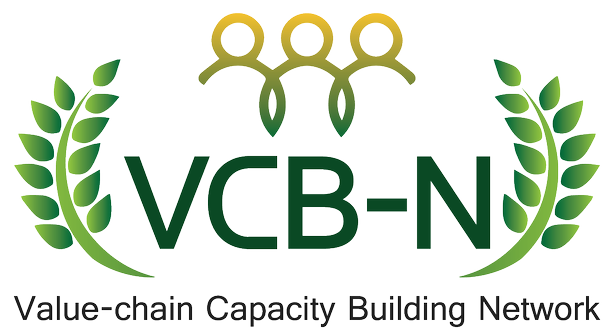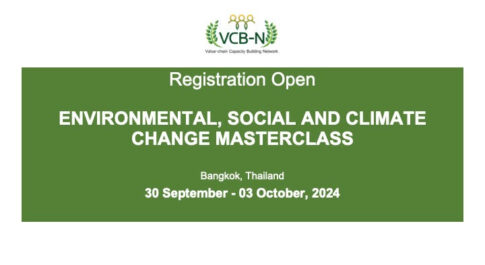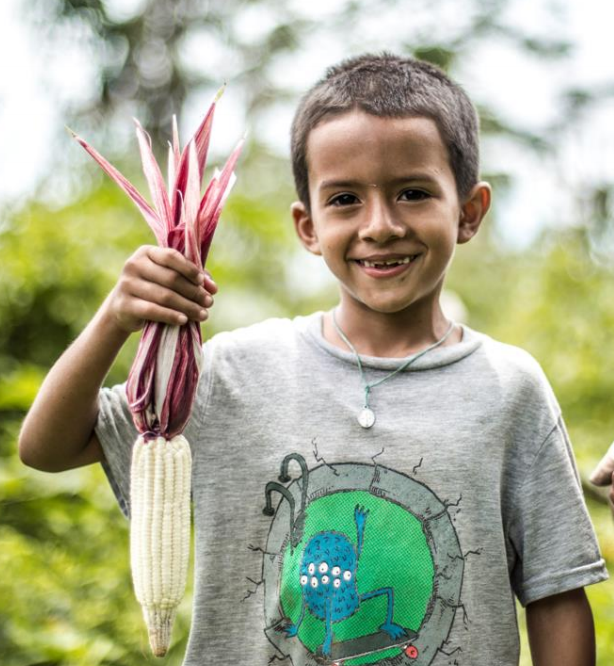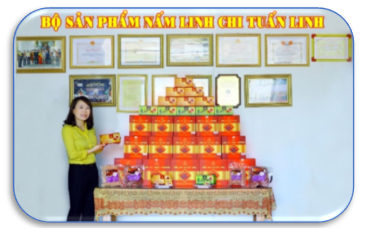
Good practice
Scale expansion and linkage in mushroom cultivation in Quang Binh
The following good practice is conducted by Le Thi Van Hong. The case study was selected and presented in Mekong Knowledge and Learning Fair (IFAD) by representative from Vietnam.
(For presentation in the event, please click here)

Background
Tuan Linh Mushroom cultivation and Agricultural Business Cooperative (Cooperative) was established in March 2016. Under the support of SRDP Quang Binh, the Cooperative formulated and implemented PPP sub-project “Scale expansion and linkage in mushroom cultivation in Quang Binh” in the period from 12/2016 to 12/2018. The sub-project is aimed to develop the linkage in production and consumption of clean mushroom among Cooperative members and between Cooperative and mushroom-cultivating Collaborative group (CG) in Quang Binh province. This will help produce prestigious mushroom products with sufficient quantity and good quality, and thus generate stable income for Cooperative members and CGs.
Innovations/ Good practices
Mushroom-cultivating households organized themselves as CGs. The CGs facilitated the linkage with Tuan Linh Cooperative in the production and consumption of mushroom. The Cooperative provided technical training, equipment and mushroom spawn bags to households through CGs and purchased mushroom products following the contract signed between the Cooperative and CGs. Additionally, joint activities in building mushroom cultivation house, formulating production plan, sharing experience and setting up of financial funds contributed to increasing production efficiency producing mushroom products required by the Cooperative. The initiative of Cooperative members also ensured its good operation by investing in facilities and equipment; piloting new varieties of mushroom; production, branding and market expansion. Figure below shows the business model.
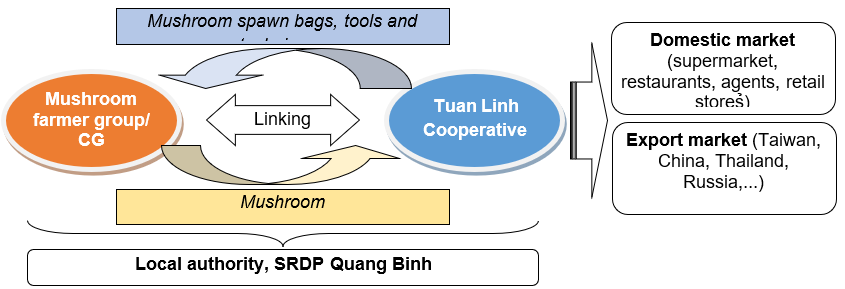
Business model of mushroom value chain adopted by Tuan Linh Cooperative
Impact
The sub-project has benefitted 360 mushroom-cultivating households in 25 CGs. it also generated job opportunities to 27 Cooperative members and 25 other labourers working at the Cooperative. Income of Cooperative members and households linked with the Cooperative through CGs achieved 100 million VND/member/year and 50 million VND/household/year, respectively. Other results:
- The Cooperative invested in workshop for mushroom cultivation with the area of 8,700 m2, capacity of 1,500,000 mushroom spawn bag/years and 150 tons of mushroom/year.
- The Cooperative provided technical training on mushroom cultivation techniques with the participation of 1,173 farmers and labourers.
- The Cooperative has cooperated with over 360 households through 25 CGs in SRDP Quang Binh target area (more than 50% of which are poor and near poor households and 95% are women)
- The Cooperative has registered brand “Tuan Linh clean mushroom” and been granted certificate of good quality and safe products.
- Mushroom products are introduced in trade fairs, hotels, restaurants and schools in Quang Binh province and advertised in websites and facebook which helped in expanding domestic market and export directly to other countries including Thailand, Russia.
- Revenue from mushroom cultivation and business achieved more than 7 billion/year
- Tuan Linh clean mushroom brand was granted Gold medal for high-quality product in 2016 and Gold brand of Vietnam Agriculture Reward 2017.
Facilitating factors
The demand for mushroom in Vietnam is significantly increasing. In the world, the import-export growth rate of mushroom attained 10%/year for the period 2006 – 2010. The cultivation of mushroom is suitable for households which lack production land, the elderly and farmers in off-season and materials mushroom cultivation are locally available including straw, sawdust, etc. The support of SRDP Quang Binh enables the Cooperative and CGs to improve their production and business condition and promotes their close linkage.
Challenges
- Mushroom-cultivating households have small production scale; production conditions and technical application is inadequate.
- Market fluctuation may affect the production and business plan of the Cooperative and the compliance of contract signed between the Cooperative and CGs (especially price of mushroom).
Lessons learned
The activities conducted by the Cooperative are lesson for the development of a clean mushroom brand:
- Invested in workshop, tools and equipment to produce good-quality mushroom spawn bags provided to CGs.
- Gave technical guidance to Cooperative members and CGs through training courses and direct mentoring towards effective production process from collection, preliminary processing, processing of materials to packaging and transport of products.
- Registered product brand and quality as stipulated by law
- Discussed and agreed on contract terms and conditions with all CGs members
- Shared information among Cooperative members and with CGs; agree on production and business plan and solutions in case of unexpected market fluctuation.
- Promoted branding through website, social networks, participation in trade fair, introduction of products directly to hotels, restaurants, schools, clean agricultural product stores, customer conference and etc., which diversified the distribution channels.
Recommendations
Regarding newly-established value chain, the capacity in management and operation and investment is comparatively limited. Therefore, along with Cooperative and CGs’ resources, external support from programmes and projects is of great necessity. Accordingly, the support for chain actors should be based on: (i) actors’ role; (ii) plans for linkage; (iii) needs for improving production stages/ activities. It is also required to develop traceability system and branding for the Cooperative.
You may want to read
